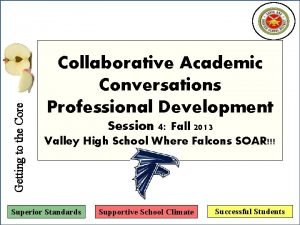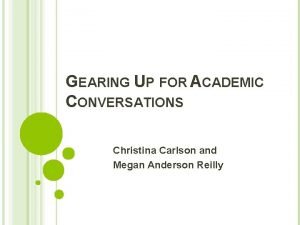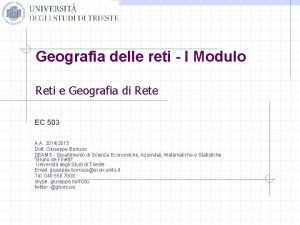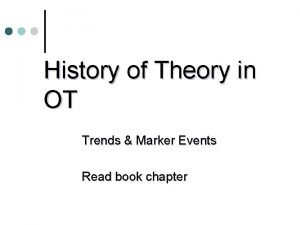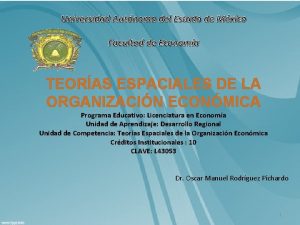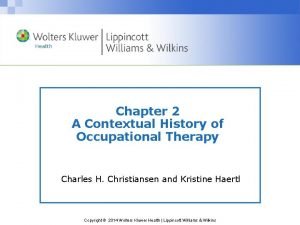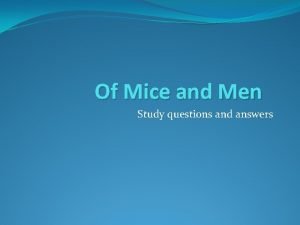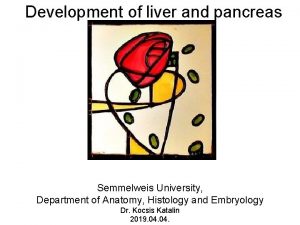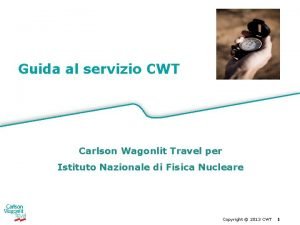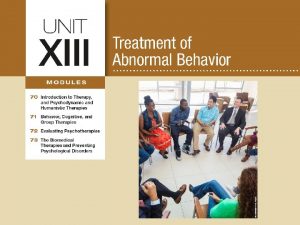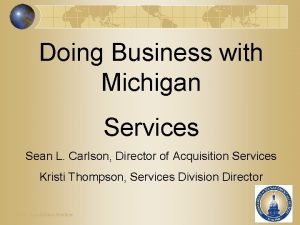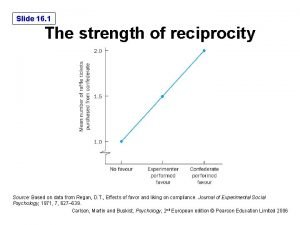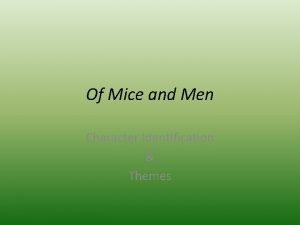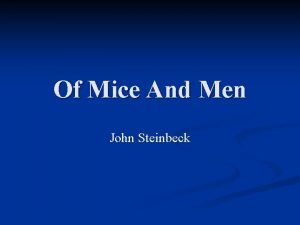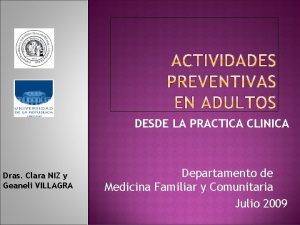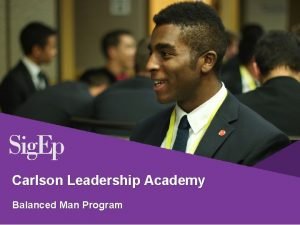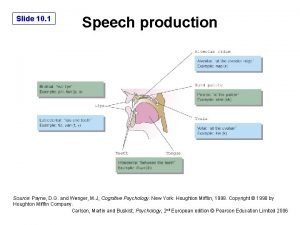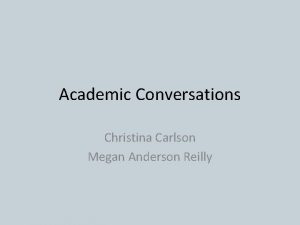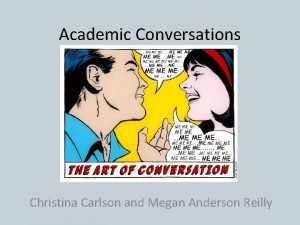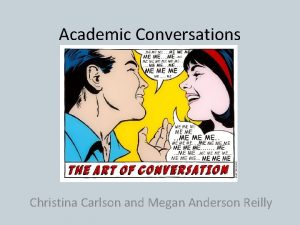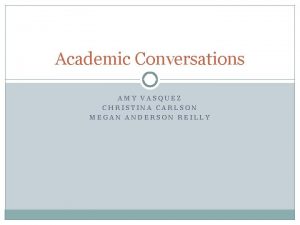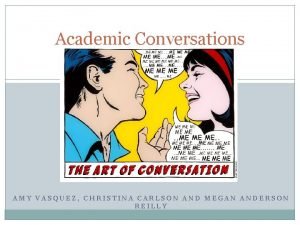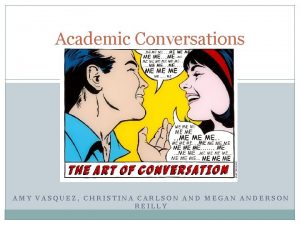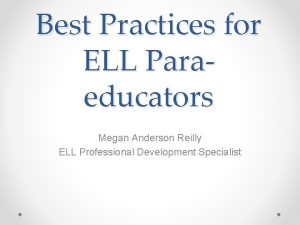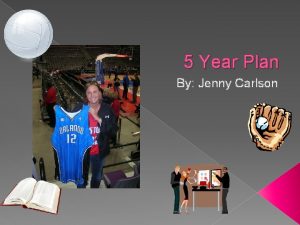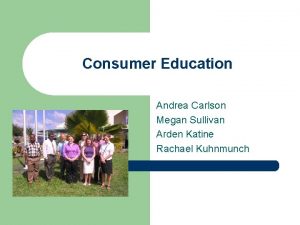Academic Conversations Christina Carlson Megan Anderson Reilly Overall
























- Slides: 24

Academic Conversations Christina Carlson Megan Anderson Reilly

Overall Objectives • Identify characteristics of Academic Conversations (WHAT) • Determine when to have Academic Conversations (WHEN) • Implement strategies for supporting academic conversations (HOW)

Today’s objectives 1. Analyze evidence of student discourse in the context of content and language objectives 2. Rehearse strategies that can be used to build core conversation skills 3. Draft a lesson plan to incorporate Academic Conversations in the next week

NORMS (page 30) • We listen to each other • We respect one another’s ideas even if they are different • We let others finish explaining their ideas without interrupting • Rehearse strategies that can be used in the classroom

Two Minute Opinion Share • Exercise or diet? Challenging another’s idea: – Then again, I think that… – Another way to look at this could be… – What struck me about what you said is… – If ______, then_________

Student Evidence • ELPS 2: An ELL can participate in grade appropriate oral and written exchanges of information, ideas, and analyses, responding to peer, audience, or reader comments and questions.

Academic Conversation Reflection 1. Share which strategies you implemented and why you chose that strategy 2. What student data did you collect? 3. What struck you from your students’ academic conversations? 3 minutes person

Five Core Skills of Academic Conversation (page 32) • Elaborate and clarify • Support ideas with examples • Build on and/or challenge a partner’s idea • Paraphrase • Synthesize conversation points

Jigsaw • Read the skill section with your group. • Highlight where you see your skill in the History dialogue provided • Join with members from other skills (group of 5) and share what you learned and where you found evidence in the dialogue. • Rehearse strategies that can be used in the classroom

Conversation practice Groups of 4 What struck you about the core skills of academic conversation? • Rehearse strategies that can be used in the classroom

Effective Conversation Tasks (page 59) • How do I know a conversation is effective? • How do I create effective conversation prompts? • How can I improve the quality of conversations during each lesson and throughout the year?

Name Feature of effective conversation tasks How does this apply to instruction?

Interview Grid (Page 54) • With a partner, choose one Feature of Effective Conversation Tasks – Read the section – Discuss the information with a partner • Paraphrase!

Name What is a feature of effective conversation tasks? How does this apply to instruction?

Creating Conversation Prompts (page 63) • All conversations happen for a reason. • What are the reasons we want students to have a conversation? – Explore ideas? – Expand ideas? – Solve problems?

Supporting Ideas with Examples • How do Zwiers and Crawford support their ideas with examples? How strong is their evidence?

Supporting Ideas with Examples • With a partner, read one of the ways to base your conversation prompt (page 64 -72) • Reciprocal Read the section with a partner – Both partners decide on where they will divide the text – Both partners read. At the end of the section, partner A summarizes. – Both partners read. At the end of the section, partner B summarizes. – Continue

Evaluating the support of examples (page 50)

Summary! • Write a summary using the Organizer for Evaluating the Support of Examples. • Share your summary with 3 other people.

Hmmm… Think of a topic for an upcoming lesson. Write four different prompts that could spark an academic conversation. Resource: Chapter 4

Opinion Continuum (page 46) • Exercise or Diet?

Now what? • Plan a lesson where you ask students to have an academic discussion. • Choose a strategy from Academic Conversations (chapter 3 -4) that we did today or that you read on your own. • Teach that strategy to achieve the language objective – Bring evidence to discuss next session – Draft a lesson plan to incorporate Academic Conversations in the next week

Today’s objectives 1. Analyze evidence of student discourse in the context of content and language objectives 2. Rehearse strategies that can be used to build core conversation skills 3. Draft a lesson plan to incorporate Academic Conversations in the next week

Thank you! • Have a great break! • Next session: January 13 – Chapter 5: Training Students for Advanced Conversations Gots Wants
 Megan anderson boots
Megan anderson boots Next steps with academic conversations
Next steps with academic conversations Next steps with academic conversations
Next steps with academic conversations John reilly mit
John reilly mit Legge di huff
Legge di huff Alder reilly
Alder reilly Where is o reilly's corporate office?
Where is o reilly's corporate office? Mary reilly occupational behavior model
Mary reilly occupational behavior model Ronald morgan goes to bat
Ronald morgan goes to bat Isodapana
Isodapana Mary reilly occupational therapy
Mary reilly occupational therapy Of mice and men chapter 1 study questions
Of mice and men chapter 1 study questions Ductus omfaloentericus
Ductus omfaloentericus Carlson control system
Carlson control system Go travel cwt
Go travel cwt Module 70 introduction to therapy
Module 70 introduction to therapy Sean carlson oakland county
Sean carlson oakland county Carlson
Carlson Lennie of mice and men-character personality traits
Lennie of mice and men-character personality traits Bob carlson retirement watch
Bob carlson retirement watch Why does curley wear a vaseline-filled glove on one hand
Why does curley wear a vaseline-filled glove on one hand Richard carlson doe
Richard carlson doe Criterios de frame y carlson
Criterios de frame y carlson Carlson leadership academy
Carlson leadership academy Carlson
Carlson

